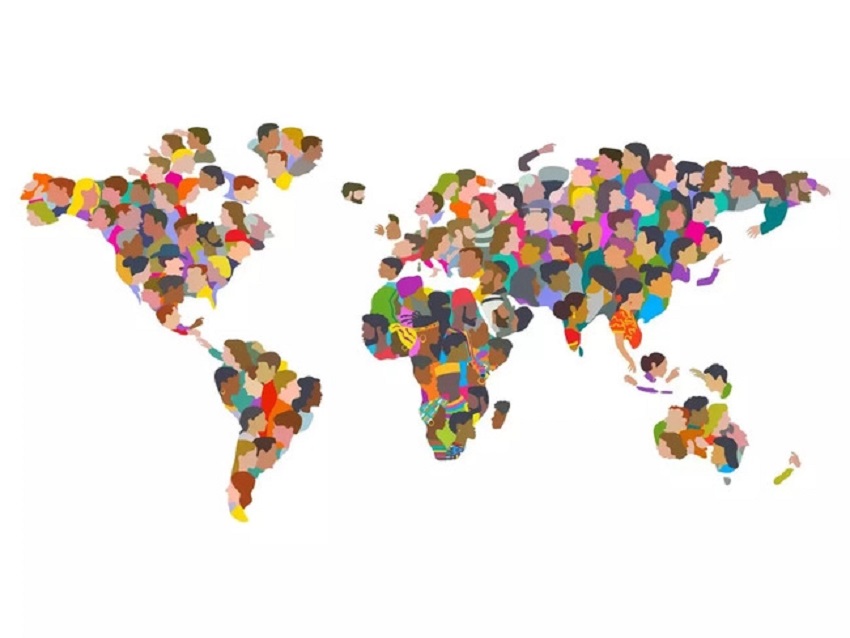General
Nigeria, 7 Others to Jerk World Population to 9.7 billion in 2050

By Adedapo Adesanya
The United Nations (UN) has said the world population will reach 8 billion this year from the current level of 7.96 billion and in 2030, the figure could rise to 8.5 billion and to 9.7 billion in 2050 before reaching a peak of around 10.4 billion in the 2080s to 2100.
In the latest UN projections, the organisation noted that more than half of the projected increase in the global population up to 2050 will be concentrated in eight countries: the Democratic Republic of the Congo, Egypt, Ethiopia, India, Nigeria, Pakistan, the Philippines and the United Republic of Tanzania.
The annual study, which was released on Monday to coincide with World Population Day, also disclosed that the global population is growing at its slowest rate since 1950, having fallen to less than one per cent in 2020 due to the COVID-19 pandemic.
Fertility, the report declares, has fallen markedly in recent decades for many countries: today, two-thirds of the global population lives in a country or area where lifetime fertility is below 2.1 births per woman, roughly the level required for zero growth in the long run, for a population with low mortality.
In most countries of sub-Saharan Africa, as well as in parts of Asia and Latin America and the Caribbean, recent reductions in fertility have led to a “demographic dividend”, with a rise in the share of the working-age population (25 to 64 years), providing an opportunity for accelerated economic growth per capita.
The report argues that to make the most of this opportunity, countries should invest in the further development of their human capital, by ensuring access to health care and quality education for all ages, and by promoting opportunities for productive employment and decent work.
Further reductions in mortality are projected to result in average global longevity of around 77.2 years in 2050. Yet in 2021, life expectancy for the least developed countries lagged seven years behind the global average.
The report recommends that countries with ageing populations should take steps to adapt public programmes to the growing numbers of older persons, establish universal health care and long-term care systems, and improve the sustainability of social security and pension systems.
“Further actions by governments aimed at reducing fertility would have little impact on the pace of population growth between now and mid-century, because of the youthful age structure of today’s global population,” said Mr John Wilmoth, Director of the Population Division of the UN Department of Economic and Social Affairs (DESA).
“This year’s World Population Day falls during a milestone year when we anticipate the birth of the Earth’s eight billionth inhabitant”, said UN Secretary-General Mr António Guterres, reacting to the report’s findings.
General
National Grid, Mr Ibu Among Top Trending Searches by Nigerians in 2024

By Dipo Olowookere
Many events happened in 2024 in Nigeria but a few shook the nation because of their impact on residents of the country.
According to a report released by Google, the incessant collapse of the national grip, which plunged the nation into darkness, was among trending searches on its platform.
In the report made available to Business Post on Tuesday, the tech giant said this year’s results show a continued interest in the political and economic landscape, with searches related to the US elections, the new national anthem.
“The 2024 Year in Search offers a unique lens into the questions, interests, and conversations that shaped the lives of Nigerians this year.
“From cultural milestones to pressing concerns, these insights reflect how Search continues to be a valuable tool for users to navigate and better understand their world,” the Communications and Public Affairs Manager for Google West Africa, Taiwo Kola-Ogunlade, stated.
Google’s 2024 Year in Search for Nigeria showcased the most popular searches, notable individuals, actors, musicians, topics, questions, and other subjects that captured Nigerians’ attention in the year.
Google’s Year in Search is an annual analysis that reveals the top trending lists and also spotlights what the world searches to see, learn, and do.
The music scene in 2024 was marked by a surge in popularity for artists like Shallipopi and Khaid, who also featured prominently in the overall personalities list. The top trending song was “”I Don’t Care” by Boy Spyce”, followed closely by “Ozeba” and “Commas” by Ayra”. Nigerians also showed a keen interest in understanding the lyrics of various songs, with “Ogechi lyrics”, “Ozeba lyrics”, and “Omemma by Chandler Moore lyrics” leading the searches in the lyrics category.
This year, Nigerians continued to demonstrate a strong interest in entertainment with movies like “A Tribe Called Judah”, “Treasure In The Sky”, and “Damsel” topping the movie charts. The top TV series that captured the interest of Nigerian netizens included “Supacell”, “My Demon”, and “Queen of Tears”. In the culinary world, Nigerians explored diverse recipes with “Pornstar Martini recipe” leading the searches.
Concerns about personal well-being and global events were also reflected in search trends. Questions like “How much is dollar to naira today?”, “How to get perfectly defined curls for African hair?”, and “Who won the US presidential election?” topped the list of queries. Nigerians were curious about the meaning of words like “demure,” “steeze,” and “pet peeves,” turning to Search for answers.
General
Fiscal Responsibility Commission Backs Controversial Tax Reform Bills

By Adedapo Adesanya
The Fiscal Responsibility Commission (FRC) has expressed strong support for the controversial Tax Reform Bills currently before the National Assembly.
The bills, developed by the Presidential Fiscal Policy and Tax Reforms Committee on instruction by President Bola Tinubu, aim to improve fiscal governance, transform public revenue architecture boost economic growth.
The Chairman of the commission, Mr Victor Muruako, expressed the support of the organisation at an interaction with academics and journalists on the sidelines of the Fellowship Lecture and Investiture Ceremony of the Capital Market Academics of Nigeria (CMAN) on Monday in Abuja.
According to a statement by FRC’s Head of Strategic Communications Officer, Mr Bede Anyanwu on Tuesday, the agency revealed that a critical analysis of the bills showed that it does not contain any issue or item that could be said to be skewed to favour any region or section of the country.
“The bills rather create a more equitable distribution of resources amongst Nigeria’s federating states,” Mr Muruako added, noting that the analysis also confirmed that the proposed reforms are designed to benefit all Nigerians, particularly low-income earners and Micro Small and Medium Businesses (MSMBs).
Mr Muruako outlined some of the key benefits of the reforms, including tax relief for low-income earners: individuals earning less than N1.7 million annually will pay less income tax, exemption of tax on small businesses with turnovers below N50 million, and exemption of over 90 per cent of small businesses from profit tax payment.
It was stated that the new bills intend to simplify tax administration in the country and make it more transparent.
Increasing revenue for subnational governments as states and local governments will receive a larger share of VAT revenue, empowering them to provide better public services, and improving ease of doing business, noting that reforms will reduce the administrative burden on businesses and make it easier to comply with tax regulations.
The FRC explained that it is upbeat that the tax relief for low-income earners will enhance savings and capital formation at household levels.
The commission also expressed confidence that given the positive correlation between savings and investment, explaining that the increase in small household investments across the board would lead to improvements in the sustainable growth of the nation’s economy.
He also opined that the reduced tax burden on small businesses would give Micro-Small Medium Enterprises breathing space, and enable them to grow organically, hence contributing to a sustained increase in the nation’s GDP in the near future.
On the recent controversies over the bills, Mr Muruako praised President Tinubu for allowing room for further dialogue, appealing to all stakeholders across geopolitical zones to support the bills because their transformative potentials stand to benefit every Nigerian.
General
CSCS Gets Dual Management System Certifications

By Adedapo Adesanya
Central Securities Clearing System (CSCS) Plc has been awarded the ISO/IEC 27001:2022 and ISO 22301:2019 certifications by the globally renowned Management System Certification Body (MSECB).
According to a statement from the firm, the Managing Director of CSCS, Mr Haruna Jalo-Waziri, said the ISO 27001 is an internationally recognised benchmark for managing information security, ensuring robust protection against data breaches and IT disruptions.
The ISO 22301 standard is an international standard that establishes the requirements for business continuity management systems.
Mr Jalo-Waziri said this recognition underscores CSCS’s steadfast commitment to international best practices in information security management and business continuity.
He noted that the ISO/IEC 27001:2022 certification highlights CSCS’s adherence to stringent information security measures, ensuring robust protection against data breaches and IT disruptions.
Mr Jalo-Waziri said that the ISO 22301:2019 certification also confirms CSCS’s business continuity and readiness to respond to unexpected incidents, minimising disruptions and safeguarding stakeholders’ interests.
“Achieving these certifications is a testament to our deliberate and strategic focus on embedding a culture of excellence, resilience, and trustworthiness in our operations.
“It underscores our commitment to maintaining the highest standards of information security and business continuity in delivering value to our stakeholders.
“These certifications position CSCS alongside leading global organisations that prioritise the confidentiality, integrity, and availability of information systems.
“They further validate the organisation’s dedication to securing its clients’ trust and ensuring operational resilience,” he said.
The CSCS MD added these certifications not only reinforce the trust of its clients, stakeholders, and regulators but also to validate the hard work and dedication of its team.
He said, that as Nigeria’s premier financial market infrastructure, the firm remains resolute in its mission to enable market confidence through best-in-class services and practices.
According to him, receiving these certifications from MSECB strengthens CSCS’s reputation as a reliable partner and a leader in the financial market ecosystem.
He said that the certifications assure stakeholders that CSCS’s processes are periodically monitored to meet and exceed compliance requirements.
This achievement, Mr Jalo-Waziri said, was a significant milestone in CSCS’s journey to consistently deliver secure, resilient, and innovative solutions to the Nigerian capital market and beyond.
-

 Feature/OPED5 years ago
Feature/OPED5 years agoDavos was Different this year
-
Travel/Tourism8 years ago
Lagos Seals Western Lodge Hotel In Ikorodu
-

 Showbiz2 years ago
Showbiz2 years agoEstranged Lover Releases Videos of Empress Njamah Bathing
-

 Banking6 years ago
Banking6 years agoSort Codes of GTBank Branches in Nigeria
-

 Economy2 years ago
Economy2 years agoSubsidy Removal: CNG at N130 Per Litre Cheaper Than Petrol—IPMAN
-

 Banking2 years ago
Banking2 years agoFirst Bank Announces Planned Downtime
-

 Sports2 years ago
Sports2 years agoHighest Paid Nigerian Footballer – How Much Do Nigerian Footballers Earn
-

 Technology4 years ago
Technology4 years agoHow To Link Your MTN, Airtel, Glo, 9mobile Lines to NIN












